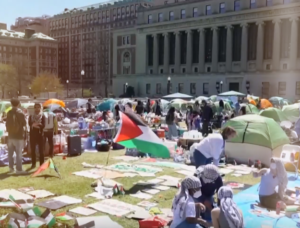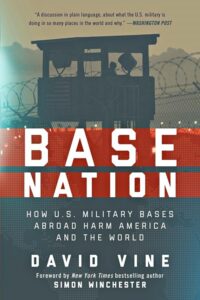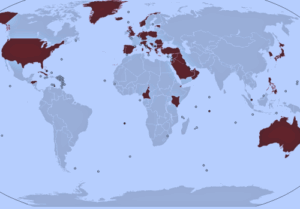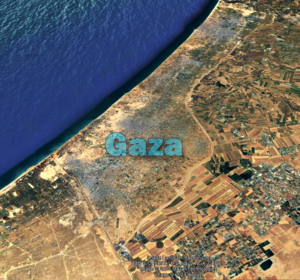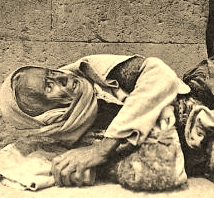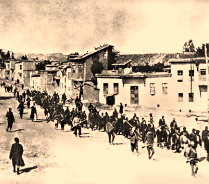Welcome to Law and Disorder Radio
Law and Disorder is a weekly independent civil liberties radio program airing on more than 150 stations and on Apple podcast. Law and Disorder provides timely legal perspectives on issues concerning civil liberties, privacy, right to dissent and practices of torture exercised by the US government and private corporations.
Law and Disorder May 5, 2025
Podcast: Play in new window | Download
A Constitutional Crisis In The United States
America is in the midst of a constitutional crisis. More than 200 lawsuits have been filed against the Trump administration during his first 100 days in office, resulting in more than 100 injunctions and stays, as he lays waste to fundamental constitutional protections and laws passed by Congress.
On the first day of his second term, Donald Trump had the audacity to sign an executive order claiming he was “restoring freedom of speech.” Instead, his administration is systematically destroying the right to speak freely, to write freely, to dissent freely, and to protest freely.
Trump ordered the elimination of “diversity, equity, and inclusion” (DEI) policies in both the public and private sectors and targeted several leading American universities, threatening to withhold federal funding for indoctrinating students with “woke” ideology, and for failing to combat antisemitism, by which he means criticism of Israel. He shut down the Voice of America and the Smithsonian Museum. He canceled the security clearances, government contracts, and access to federal buildings of several prominent law firms because he didn’t like the clients they represented. He even excluded the Associated Press from the White House because it refused to call the Gulf of Mexico, the Gulf of America.
In one of the most egregious violations of the First Amendment, the Trump administration canceled foreign student visas and deported legal permanent residents, claiming their campus protests were contrary to U.S. foreign policy interests.
Guest – Dahlia Taha, is a Policy Manager at the Muslim Public Affairs Council, where she leads the First Amendment and Civil Liberties work. Dahlia is a Palestinian-American Muslim. Prior to joining the MPAC team, she served as a Project Manager at The Texas A&M Foundation, where she researched and analyzed maternal health policy. At MPAC, Dahlia works to champion policies and initiatives that uplift and advocate for the Muslim Community nationwide, with a particular focus on protecting the First Amendment, academic institutions, and the next generation of American Muslims.
I am particularly pleased to have Dahlia with us today, because she and I are about to launch a podcast called Rapid Response, sponsored by MPAC, in which we will examine the struggle of students and community members – Muslims, Jews, and allies -, who have been targeted by the Trump administration for expressing political views in favor of Palestinian rights and sovereignty which the government is seeking to suppress.
—-
Base Nation: How U.S. Military Bases Abroad Harm America and the World
One of the most consequential pillars of U.S. military power is also one of its most overlooked: our vast network of overseas military bases. In his meticulously researched book Base Nation: How U.S. Military Bases Abroad Harm America and the World, author and anthropologist David Vine reveals how more than 800 U.S. military installations scattered across foreign lands are not merely symbols of strength—they’re often sources of harm. From the Pacific islands to the Middle East and Europe, these bases have become fixtures of American empire. However, they rarely receive the scrutiny they deserve from policymakers or the public.
Vine documents how this sprawling base network fuels geopolitical tension, fosters anti-American resentment, and props up authoritarian regimes. He shows how bases displace local populations, pollute ecosystems, and even affect the mental health and family lives of U.S. troops stationed abroad. And while Pentagon officials downplay the cost, Vine’s analysis reveals that maintaining these foreign outposts drains nearly $100 billion each year from U.S. taxpayers—money that could instead fund urgent domestic priorities.
Perhaps most troubling is how these bases have enabled decades of interventionist wars, making it easier for the U.S. to engage militarily across the globe without addressing root causes of conflict or engaging in genuine diplomacy.Our guest will discuss what a post-base foreign policy might look like, who benefits from the current system, and what’s behind the emerging bipartisan calls to rein it in
Guest – David Vine is a writer and political anthropologist. David was a professor of anthropology at American University for 18 years (2006-2024), He is also the author of Island of Shame: The Secret History of the US Military Base on Diego Garcia.
———————
Law and Disorder April 28, 2025
Podcast: Play in new window | Download
Chris Hedges: Trump 2.0
Trump 2.0 is qualitatively different from his first term in office. This time Trump and his allies have brought down a tsunami on us, creating fear and chaos. Tens of thousands of government workers have been fired. Thousands have been deported, some to a torture prison in El Salvador. Due process was ignored. The court orders challenging this have been ignored, as well.
With his extreme tariff measures, Trump has damaged our economy, and it looks like there may be a recession down the road. Trump has promised to use the Army and National Guard to suppress protests. Should there be an act of violence committed by a lone wolf, Trump could use it as an excuse to invoke the Insurrection Act and call out the troops. This is all too reminiscent of what happened in Germany when a lone wolf set fire to the German parliament building. Hitler used this as a pretext for suspending civil rights and civil liberties and outlawing the communist and socialist parties, which were huge at the time.
Moreover, and most importantly, not only politics, but the culture of our country is being changed, as well. The Department of Education has been disbanded. Books are banned. Certain words are forbidden. Universities have come under Trump’s control, starting with Columbia University in New York City The great Kennedy Center, a mecca for U.S. culture, has been taken over by Trump and his Philistine allies.
Chris Hedges, the journalist and author spent two decades as a foreign correspondent serving as the Middle East Bureau Chief and Balkan Bureau Chief for The New York Times where he was awarded the Pulitzer Prize. He is the author of 14 books including War is a Force That Gives us Meaning, Days of Destruction, Days of Revolt, which he co-wrote with the cartoonist Joe Sacco, and The Death of the Liberal Class. Chris’ forthcoming book is titled A Genocide Foretold.
—-
The Great Moral Crime Of Our Time
Israeli -American killing of the Palestinian people living in Gaza is the great moral crime of our time. Gaza is a strip of land 25 miles long and 5 miles wide situated on the shore of the Mediterranean Sea immediately South of Israel. It used to have a population of 2.3 million people and was one of the most densely populated areas on the planet.
The Palestinian people have been murdered by American made bombs dropped on them from American planes and American drones for the last year and a half. A short cease-fire, was recently unilaterally broken by Israel, which resumed the killing in preparation for the removal of the entire population to the Sudan or the Sinai desert in Egypt.
Guest – Philip Weiss is the founder of Mondoweiss, a news and opinion website known for its critical perspective on Zionism and Israeli government policies as well as his support for Palestinian rights. Weiss, a former mainstream journalist, launched Mondoweiss in the mid 2000s as a personal blog before it evolved into a larger platform. His background includes work with publications such as the New York Observer and Esquire magazine. Overtime, Mondoweiss has built a team of contributors and has become a significant voice in progressive circles when it comes to Middle Eastern policies.
—————————-
Law and Disorder April 21, 2025
Podcast: Play in new window | Download
Radio Documentary – It Was Genocide: Armenian Survivor Stories
Around the world, April 24 marks the observance of the Armenian Genocide. On that day in 1915 the Interior Minister of the Ottoman Empire ordered the arrest and hangings of Armenian intellectuals and community leaders in Constantinople. It was the beginning of a systematic and well-documented plan to eliminate the Armenians, who were Christian, and who had been under Ottoman rule and treated as second class citizens since the 15th century.
The unspeakable and gruesome nature of the killings—beheadings of groups of babies, dismemberments, mass burnings, mass drownings, use of toxic gas, lethal injections of morphine or injections with the blood of typhoid fever patients—render oral histories particularly difficult for survivors of the victims.
Why did this happen? Despite being deemed inferior to Turkish Muslims, the Armenian community had attained a prestigious position in the Ottoman Empire and the central authorities there grew apprehensive of their power and longing for a homeland. The concerted plan of deportation and extermination was effected, in large part, because World War I demanded the involvement and concern of potential allied countries. As the writer Grigoris Balakian wrote, the war provided the Turkish government “their sole opportunity, one unprecedented” to exploit the chaos of war in order to carry out their extermination plan.
As Armenians escaped to several countries, including the United States, a number came to New Britain, Connecticut in 1892 to work in the factories of what was then known as the hardware capital of the world. By 1940 nearly 3,000 Armenians lived there in a tight-knit community.
Pope Frances calls it a duty not to forget “the senseless slaughter” of an estimated one and a half million Armenians by the Ottoman Turks from 1915 to 1923. “Concealing or denying evil is like allowing a wound to keep bleeding without bandaging it,” the Pope said just two weeks before the 100th anniversary of the systematic implementation of a plan to exterminate the Armenian race.
Special thanks to Jennie Garabedian, Arthur Sheverdian, Ruth Swisher, Harry Mazadoorian, and Roxie Maljanian. Produced and written by Heidi Boghosian and Geoff Brady.
—-
Investigating Armenian-American Debanking Trend
The greater Los Angeles area is home to the largest Armenian population outside of Armenia—estimated at over 200,000 people. For years, that community has faced instances of racism and discrimination, including a rise in anti-Armenian racism, known as “Armenophobia.”
In 2022, leaked audio recordings revealed derogatory remarks by Los Angeles City Council members about Armenians, reflecting underlying biases within political institutions.
Recently, the Armenian Bar Association has launched an investigation into alleged discriminatory practices by banks in the Los Angeles area, where Armenian-American individuals and businesses have reported abrupt and unexplained closures of their bank accounts. These closures raise alarms about potential ethnic or national origin-based profiling, particularly considering ongoing geopolitical tensions in the South Caucasus.
This troubling trend comes at a time when the U.S. government is considering a major financial arrangement with Azerbaijan. The Armenian Bar Association has issued a formal objection to a proposed $100 million loan or financial guarantee to Azerbaijan under the authority of the Export-Import Bank Act of 1945. The Bar Association argues that such financial support would not only contradict U.S. human rights values but could also embolden a regime with a well-documented history of aggression against Armenia and the indigenous Armenians of Artsakh (Nagorno-Karabakh), many of whom have recently been displaced.
The Bar Association’s efforts reflect broader concerns about the security and civil rights of Armenian-Americans at home, as well as U.S. foreign policy decisions that may have far-reaching consequences abroad. arwc@armenianboard.org
Guest – Alex Hrag Bastian, a member of the ABA’s Board of Governors and Chair of its Armenian Rights Watch Committee.
—————————–
